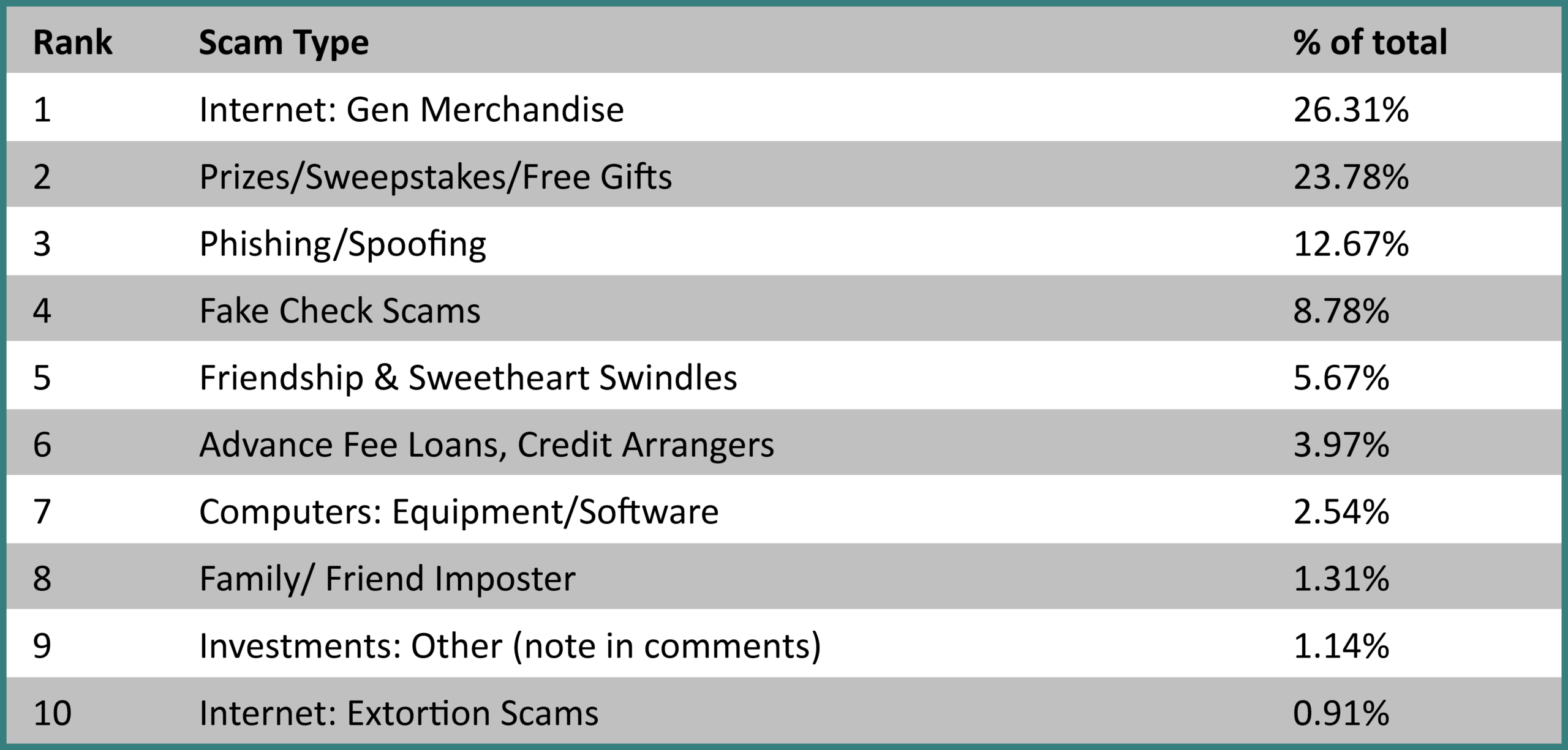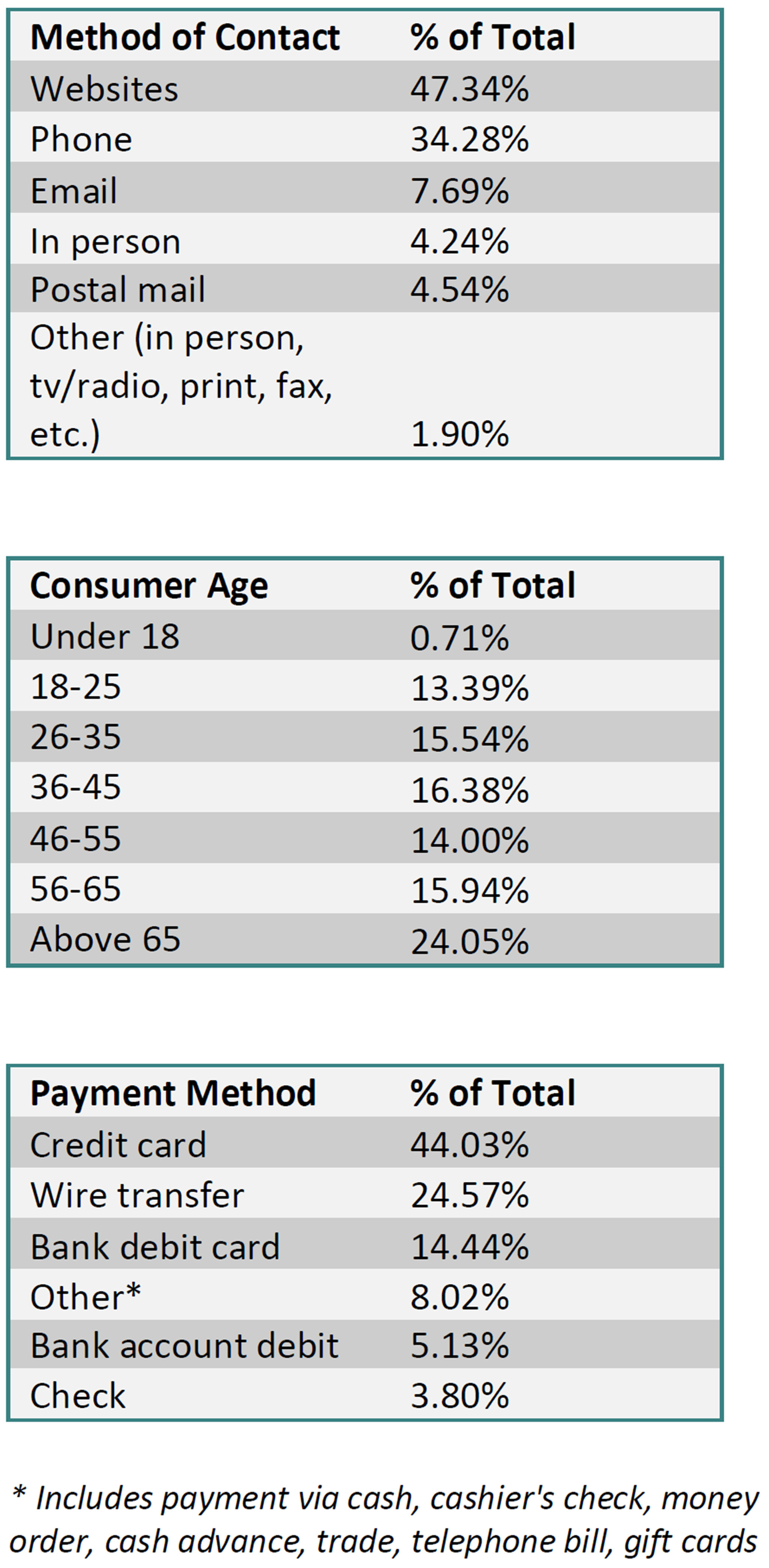About Us
Fraud.org is a project of
The National Consumers League.
info@nclnet.org
(202) 835-3323
1701 K St NW
Suite 1200,
Washington, DC 20006
© Copyright 2026. All rights reserved.
Each year, the National Consumers League analyzes the thousands of complaints received at Fraud.org from consumers and releases it to the public, in order to track trends in scams and to use as an educational tool for fraud prevention.
With millions of Americans out of work and struggling to make ends meet due to the COVID-19 pandemic, scammers looked to take advantage of consumers’ financial struggles in 2020. The number of complaints we received at Fraud.org regarding bogus prizes, sweepstakes, and free gifts nearly doubled in 2020 versus what we received in 2019. Overall, such scams were the second most reported type of scam last year, making up nearly a quarter (23.78%) of all the complaints filed at Fraud.org. Another growing scam in 2020 were friendship and sweetheart scams, also known as romance scams. The number of complaints about such scams increased by 30.06% in 2020, making it the fifth-most reported category of scam, with a median loss of $1,628. Given the social isolation brought on by the COVID pandemic, this data underscores the rising risk of such scams.
The overall top scam in 2019—Internet merchandise scams—remained unchanged retained its spot from 2019, making up 1 in 4 of the complaints we received. These scams involve merchandise purchased from bogus websites selling discounted items such as luxury apparel, electronics, and supplements or medications.
 The percentage of complaints received from consumers aged 26-65 decreased by an average of 8.76% in 2020. By comparison, complaints from consumers aged 25 and below and those 65 and older increased by an average of 30.60% and 15.82%, respectively versus 2019.
The percentage of complaints received from consumers aged 26-65 decreased by an average of 8.76% in 2020. By comparison, complaints from consumers aged 25 and below and those 65 and older increased by an average of 30.60% and 15.82%, respectively versus 2019.
For consumers aged 25 and under, the top three most reported fraud categories were Internet merchandise scams, fake check scams, and romance scams. For those 65 and older, the top complaint categories were prize/sweepstakes scams, phishing/spoofing, and Internet merchandise scams.
With email spam filters growing increasingly successful at blocking out scam emails, fraudsters continued to turn to the Web and the telephone to find victims. Those two contact methods were mentioned in more than 81% of the complaints (Web: 47.34%; Telephone: 34.28%). This data highlights the need for consumers to be wary when responding to messages from unknown senders, particularly those encountered on social media. Consumers should also continue to be on guard for unknown callers seeking to offer them prizes or other inducements to send money, as these made up nearly half (46.72%) of the complaints received where the scammer made contact over the phone.
 Internet: General Merchandise Sales (not auctions)
Internet: General Merchandise Sales (not auctions)
Goods purchased are either never delivered or misrepresented
Prizes/Sweepstakes/Free Gifts
Requests for payment to claim fictitious prizes, lottery winnings, or gifts
Phishing/Spoofing
Emails pretending to be from a well-known source ask consumers to enter or confirm personal
information
Fake Check Scams
Consumers paid wi r work or for items they’re trying to sell, instructed to wire money back to buyer
Friendship & Sweetheart Swindles
Con artist nurtures an online relationship, builds trust, and convinces victim to send money
Advance Fee Loans, Credit Arrangers
False promises of business or personal loans, even if credit is bad, for a fee upfront
Computers: Equipment and Software
Scammers claim to offer “technical support” for computer problems
and charge a fee to fix a nonexistent problem
Family and Friend Imposters
A scammer calls or emails, claiming that a friend or family member is in distress (in jail, in the hospital, etc.) and urgently needs funds to help
Investments
Investment opportunities in: day trading; gold and gems; art; rare coins; other investment products; reports about companies that offer advice or seminars on investments; etc.
Internet: Extortion Scams
Consumer threatened with release of embarrassing information or other adverse outcomes unless a fee is paid
Regardless of the type of scam, many instances of fraud can be avoided by remembering the old rule of thumb: If something seems too good to be true—it probably is.
If you ever do have questions about a potential fraud or think you might be a victim of a scam, report it immediately via Fraud.org’s secure online complaint form. Embarrassment or fear of friends and relatives finding out about the crime causes many victims of fraud to remain silent. Only by speaking out can we give law enforcement the tools they need to bring these criminals to justice.
Fraud.org’s Top Ten Scams report is compiled annually from complaints received directly from consumers. We do not attempt to verify the authenticity of these complaints, nor do they represent a scientific sample. To get more information on these scams or report suspected fraud, please visit Fraud.org.
Fraud.org is supported by the generous donations by members of our community. You can make a secure, tax-deductible gift here.
Fraud.org is a project of
The National Consumers League.
info@nclnet.org
(202) 835-3323
1701 K St NW
Suite 1200,
Washington, DC 20006
© Copyright 2026. All rights reserved.
